Article Review: Neo-liberalism, Sustainable Development, and SDGs
VerifiedAdded on 2020/04/21
|10
|2129
|35
Report
AI Summary
This article review examines the complex relationship between neo-liberalism and sustainable development, particularly in the context of developing countries. The review highlights the debate surrounding the impact of neo-liberal policies, such as privatization and reduced government interference, on environmental sustainability and the achievement of Sustainable Development Goals (SDGs). It discusses how the article critiques the neo-liberal approach, which often prioritizes economic growth through free markets and privatization, and its potential negative consequences on environmental protection and social equity. The review also explores the authors' arguments that the commercialization of SDGs, through mechanisms like the Clean Development Mechanism, often benefits the wealthy and neglects the needs of the poor. The article emphasizes the need for broader reforms that empower marginalized communities and ensures their equal participation in sustainable development initiatives. The review concludes by underscoring the importance of integrating social, environmental, and economic considerations to achieve genuine sustainable development, and the need to address the challenges posed by neo-liberalism to ensure that the SDGs are not undermined.
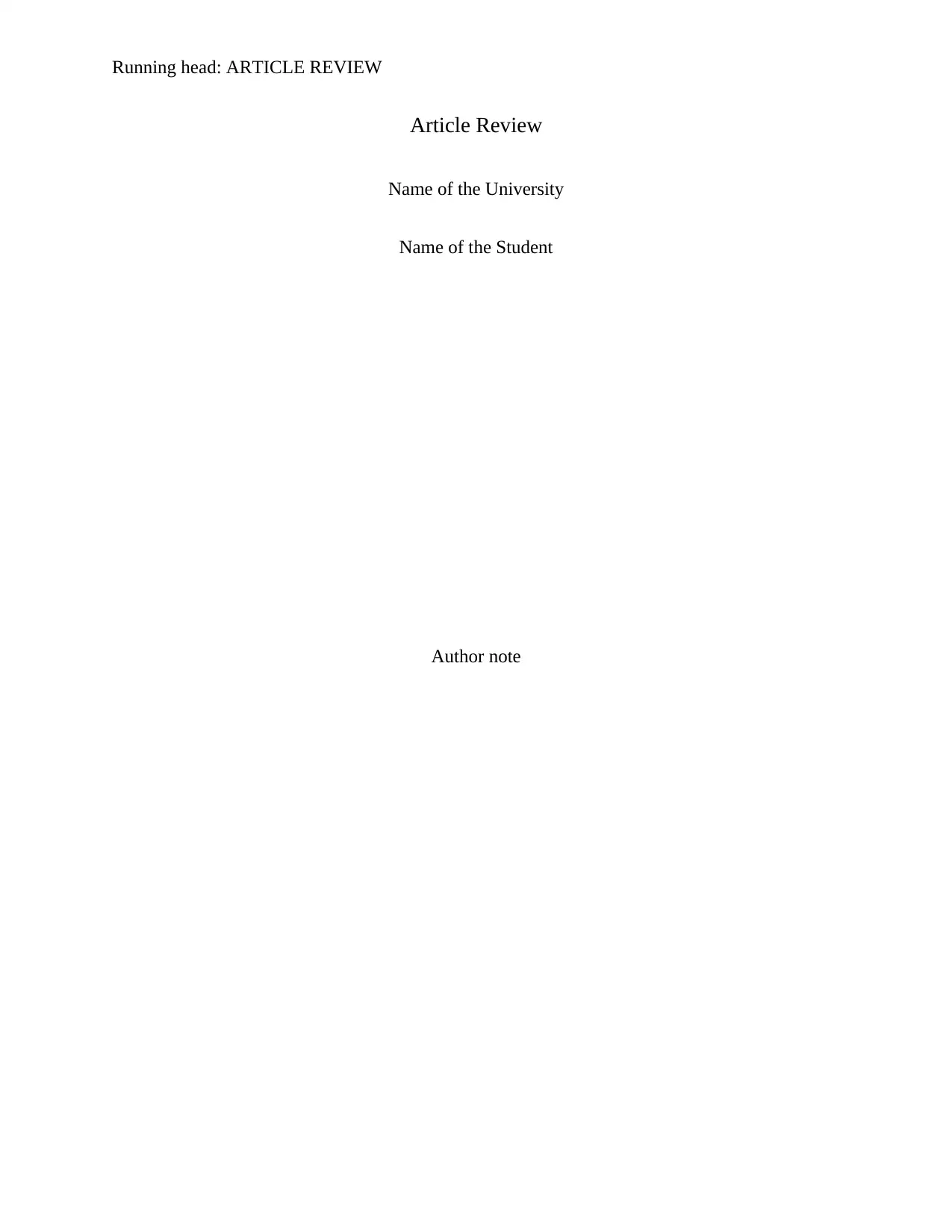
Running head: ARTICLE REVIEW
Article Review
Name of the University
Name of the Student
Author note
Article Review
Name of the University
Name of the Student
Author note
Paraphrase This Document
Need a fresh take? Get an instant paraphrase of this document with our AI Paraphraser
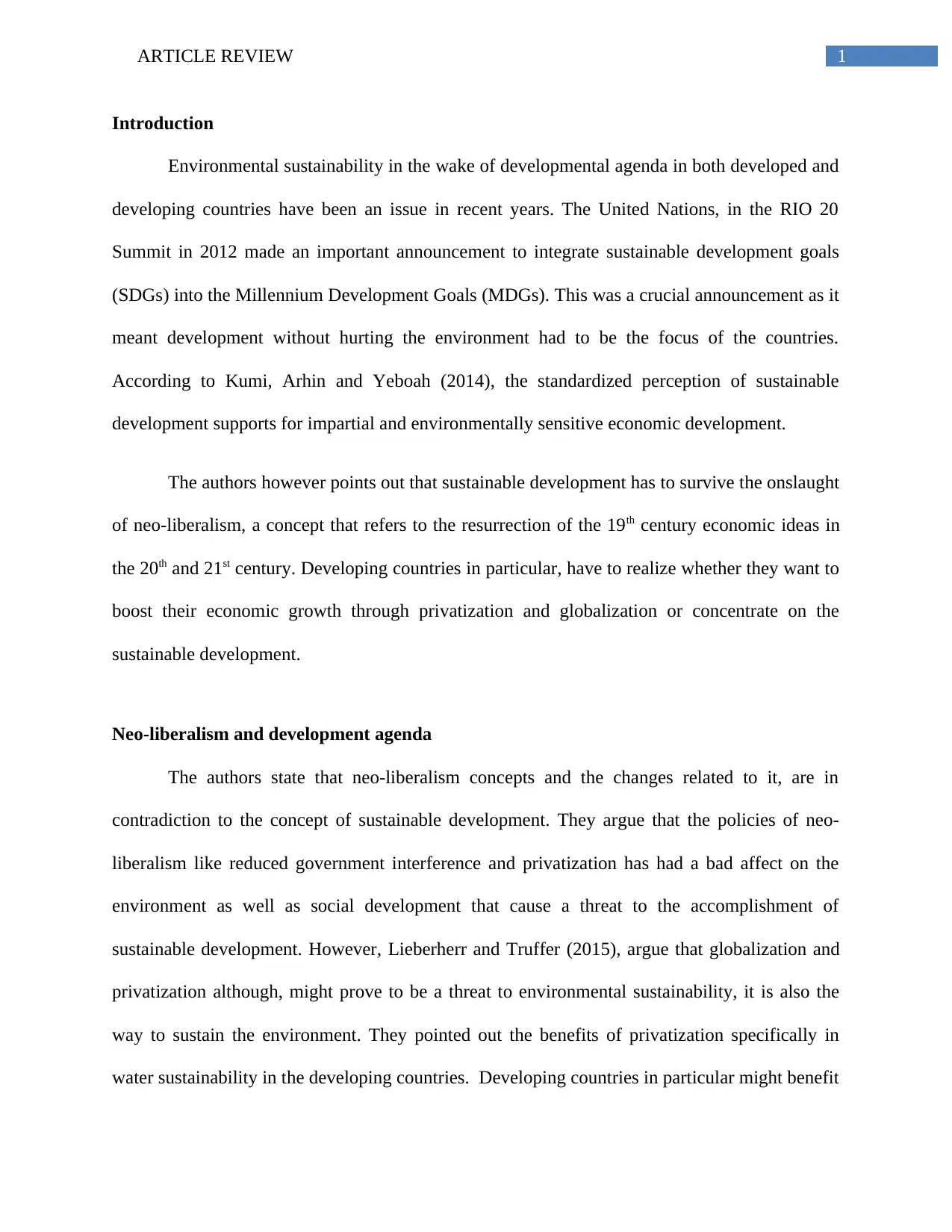
1ARTICLE REVIEW
Introduction
Environmental sustainability in the wake of developmental agenda in both developed and
developing countries have been an issue in recent years. The United Nations, in the RIO 20
Summit in 2012 made an important announcement to integrate sustainable development goals
(SDGs) into the Millennium Development Goals (MDGs). This was a crucial announcement as it
meant development without hurting the environment had to be the focus of the countries.
According to Kumi, Arhin and Yeboah (2014), the standardized perception of sustainable
development supports for impartial and environmentally sensitive economic development.
The authors however points out that sustainable development has to survive the onslaught
of neo-liberalism, a concept that refers to the resurrection of the 19th century economic ideas in
the 20th and 21st century. Developing countries in particular, have to realize whether they want to
boost their economic growth through privatization and globalization or concentrate on the
sustainable development.
Neo-liberalism and development agenda
The authors state that neo-liberalism concepts and the changes related to it, are in
contradiction to the concept of sustainable development. They argue that the policies of neo-
liberalism like reduced government interference and privatization has had a bad affect on the
environment as well as social development that cause a threat to the accomplishment of
sustainable development. However, Lieberherr and Truffer (2015), argue that globalization and
privatization although, might prove to be a threat to environmental sustainability, it is also the
way to sustain the environment. They pointed out the benefits of privatization specifically in
water sustainability in the developing countries. Developing countries in particular might benefit
Introduction
Environmental sustainability in the wake of developmental agenda in both developed and
developing countries have been an issue in recent years. The United Nations, in the RIO 20
Summit in 2012 made an important announcement to integrate sustainable development goals
(SDGs) into the Millennium Development Goals (MDGs). This was a crucial announcement as it
meant development without hurting the environment had to be the focus of the countries.
According to Kumi, Arhin and Yeboah (2014), the standardized perception of sustainable
development supports for impartial and environmentally sensitive economic development.
The authors however points out that sustainable development has to survive the onslaught
of neo-liberalism, a concept that refers to the resurrection of the 19th century economic ideas in
the 20th and 21st century. Developing countries in particular, have to realize whether they want to
boost their economic growth through privatization and globalization or concentrate on the
sustainable development.
Neo-liberalism and development agenda
The authors state that neo-liberalism concepts and the changes related to it, are in
contradiction to the concept of sustainable development. They argue that the policies of neo-
liberalism like reduced government interference and privatization has had a bad affect on the
environment as well as social development that cause a threat to the accomplishment of
sustainable development. However, Lieberherr and Truffer (2015), argue that globalization and
privatization although, might prove to be a threat to environmental sustainability, it is also the
way to sustain the environment. They pointed out the benefits of privatization specifically in
water sustainability in the developing countries. Developing countries in particular might benefit
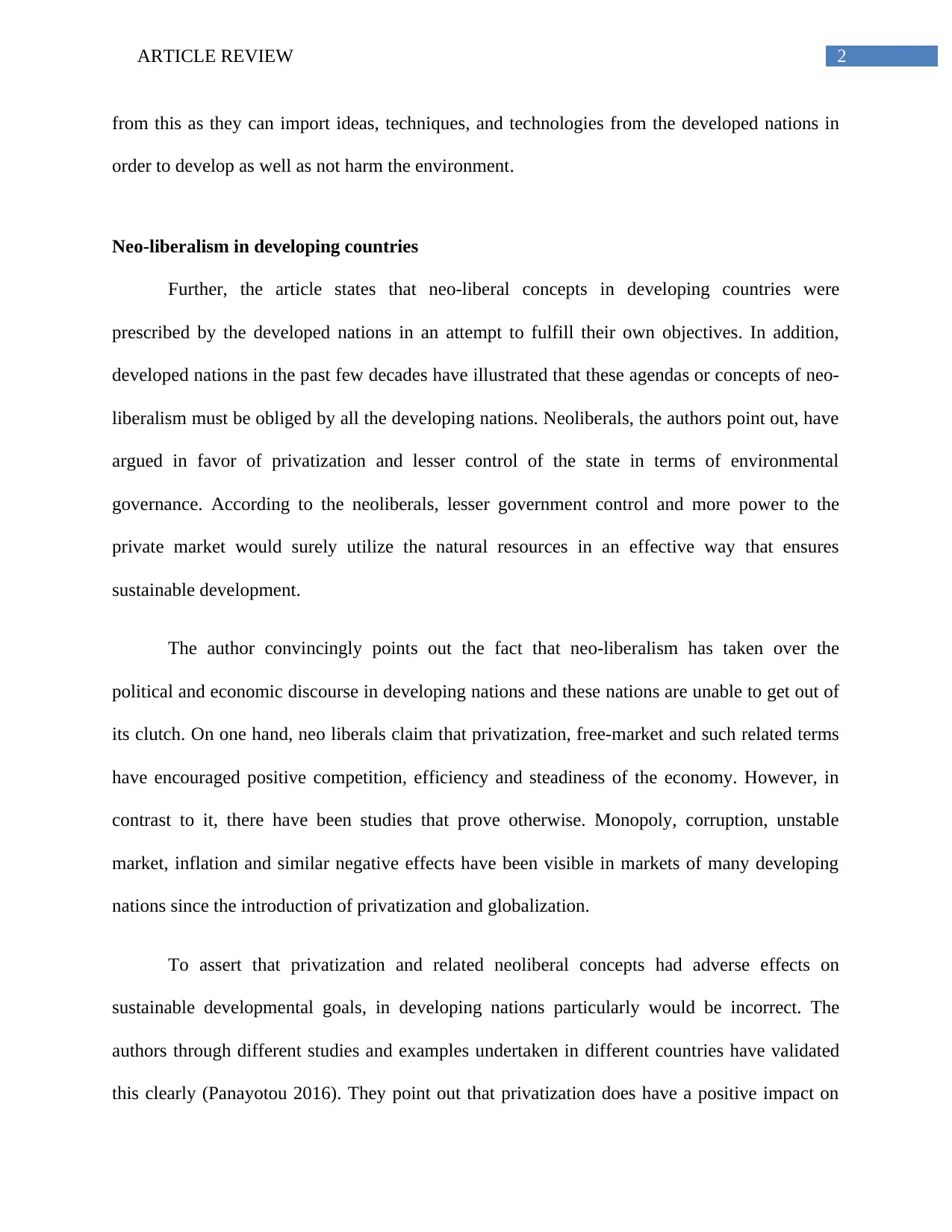
2ARTICLE REVIEW
from this as they can import ideas, techniques, and technologies from the developed nations in
order to develop as well as not harm the environment.
Neo-liberalism in developing countries
Further, the article states that neo-liberal concepts in developing countries were
prescribed by the developed nations in an attempt to fulfill their own objectives. In addition,
developed nations in the past few decades have illustrated that these agendas or concepts of neo-
liberalism must be obliged by all the developing nations. Neoliberals, the authors point out, have
argued in favor of privatization and lesser control of the state in terms of environmental
governance. According to the neoliberals, lesser government control and more power to the
private market would surely utilize the natural resources in an effective way that ensures
sustainable development.
The author convincingly points out the fact that neo-liberalism has taken over the
political and economic discourse in developing nations and these nations are unable to get out of
its clutch. On one hand, neo liberals claim that privatization, free-market and such related terms
have encouraged positive competition, efficiency and steadiness of the economy. However, in
contrast to it, there have been studies that prove otherwise. Monopoly, corruption, unstable
market, inflation and similar negative effects have been visible in markets of many developing
nations since the introduction of privatization and globalization.
To assert that privatization and related neoliberal concepts had adverse effects on
sustainable developmental goals, in developing nations particularly would be incorrect. The
authors through different studies and examples undertaken in different countries have validated
this clearly (Panayotou 2016). They point out that privatization does have a positive impact on
from this as they can import ideas, techniques, and technologies from the developed nations in
order to develop as well as not harm the environment.
Neo-liberalism in developing countries
Further, the article states that neo-liberal concepts in developing countries were
prescribed by the developed nations in an attempt to fulfill their own objectives. In addition,
developed nations in the past few decades have illustrated that these agendas or concepts of neo-
liberalism must be obliged by all the developing nations. Neoliberals, the authors point out, have
argued in favor of privatization and lesser control of the state in terms of environmental
governance. According to the neoliberals, lesser government control and more power to the
private market would surely utilize the natural resources in an effective way that ensures
sustainable development.
The author convincingly points out the fact that neo-liberalism has taken over the
political and economic discourse in developing nations and these nations are unable to get out of
its clutch. On one hand, neo liberals claim that privatization, free-market and such related terms
have encouraged positive competition, efficiency and steadiness of the economy. However, in
contrast to it, there have been studies that prove otherwise. Monopoly, corruption, unstable
market, inflation and similar negative effects have been visible in markets of many developing
nations since the introduction of privatization and globalization.
To assert that privatization and related neoliberal concepts had adverse effects on
sustainable developmental goals, in developing nations particularly would be incorrect. The
authors through different studies and examples undertaken in different countries have validated
this clearly (Panayotou 2016). They point out that privatization does have a positive impact on
⊘ This is a preview!⊘
Do you want full access?
Subscribe today to unlock all pages.

Trusted by 1+ million students worldwide
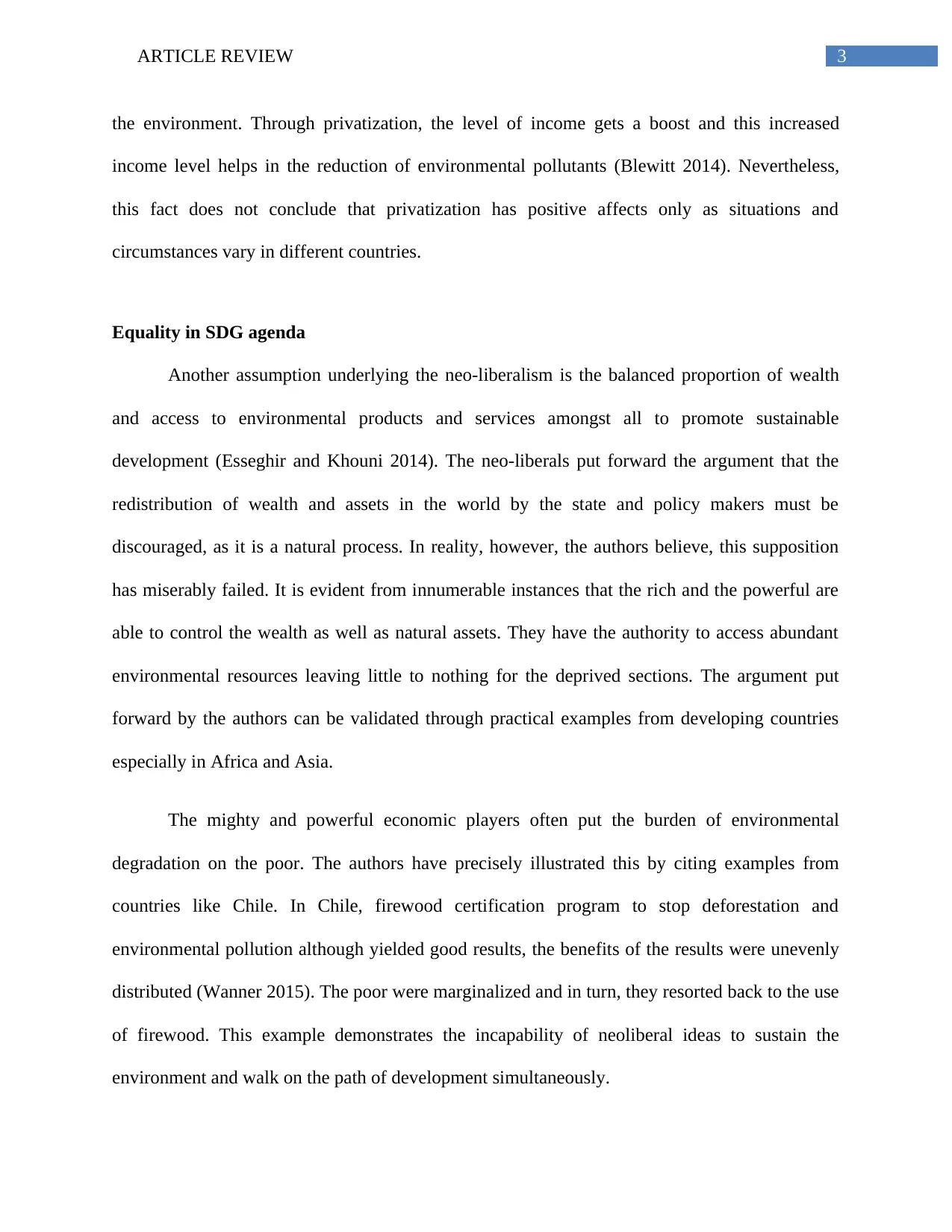
3ARTICLE REVIEW
the environment. Through privatization, the level of income gets a boost and this increased
income level helps in the reduction of environmental pollutants (Blewitt 2014). Nevertheless,
this fact does not conclude that privatization has positive affects only as situations and
circumstances vary in different countries.
Equality in SDG agenda
Another assumption underlying the neo-liberalism is the balanced proportion of wealth
and access to environmental products and services amongst all to promote sustainable
development (Esseghir and Khouni 2014). The neo-liberals put forward the argument that the
redistribution of wealth and assets in the world by the state and policy makers must be
discouraged, as it is a natural process. In reality, however, the authors believe, this supposition
has miserably failed. It is evident from innumerable instances that the rich and the powerful are
able to control the wealth as well as natural assets. They have the authority to access abundant
environmental resources leaving little to nothing for the deprived sections. The argument put
forward by the authors can be validated through practical examples from developing countries
especially in Africa and Asia.
The mighty and powerful economic players often put the burden of environmental
degradation on the poor. The authors have precisely illustrated this by citing examples from
countries like Chile. In Chile, firewood certification program to stop deforestation and
environmental pollution although yielded good results, the benefits of the results were unevenly
distributed (Wanner 2015). The poor were marginalized and in turn, they resorted back to the use
of firewood. This example demonstrates the incapability of neoliberal ideas to sustain the
environment and walk on the path of development simultaneously.
the environment. Through privatization, the level of income gets a boost and this increased
income level helps in the reduction of environmental pollutants (Blewitt 2014). Nevertheless,
this fact does not conclude that privatization has positive affects only as situations and
circumstances vary in different countries.
Equality in SDG agenda
Another assumption underlying the neo-liberalism is the balanced proportion of wealth
and access to environmental products and services amongst all to promote sustainable
development (Esseghir and Khouni 2014). The neo-liberals put forward the argument that the
redistribution of wealth and assets in the world by the state and policy makers must be
discouraged, as it is a natural process. In reality, however, the authors believe, this supposition
has miserably failed. It is evident from innumerable instances that the rich and the powerful are
able to control the wealth as well as natural assets. They have the authority to access abundant
environmental resources leaving little to nothing for the deprived sections. The argument put
forward by the authors can be validated through practical examples from developing countries
especially in Africa and Asia.
The mighty and powerful economic players often put the burden of environmental
degradation on the poor. The authors have precisely illustrated this by citing examples from
countries like Chile. In Chile, firewood certification program to stop deforestation and
environmental pollution although yielded good results, the benefits of the results were unevenly
distributed (Wanner 2015). The poor were marginalized and in turn, they resorted back to the use
of firewood. This example demonstrates the incapability of neoliberal ideas to sustain the
environment and walk on the path of development simultaneously.
Paraphrase This Document
Need a fresh take? Get an instant paraphrase of this document with our AI Paraphraser
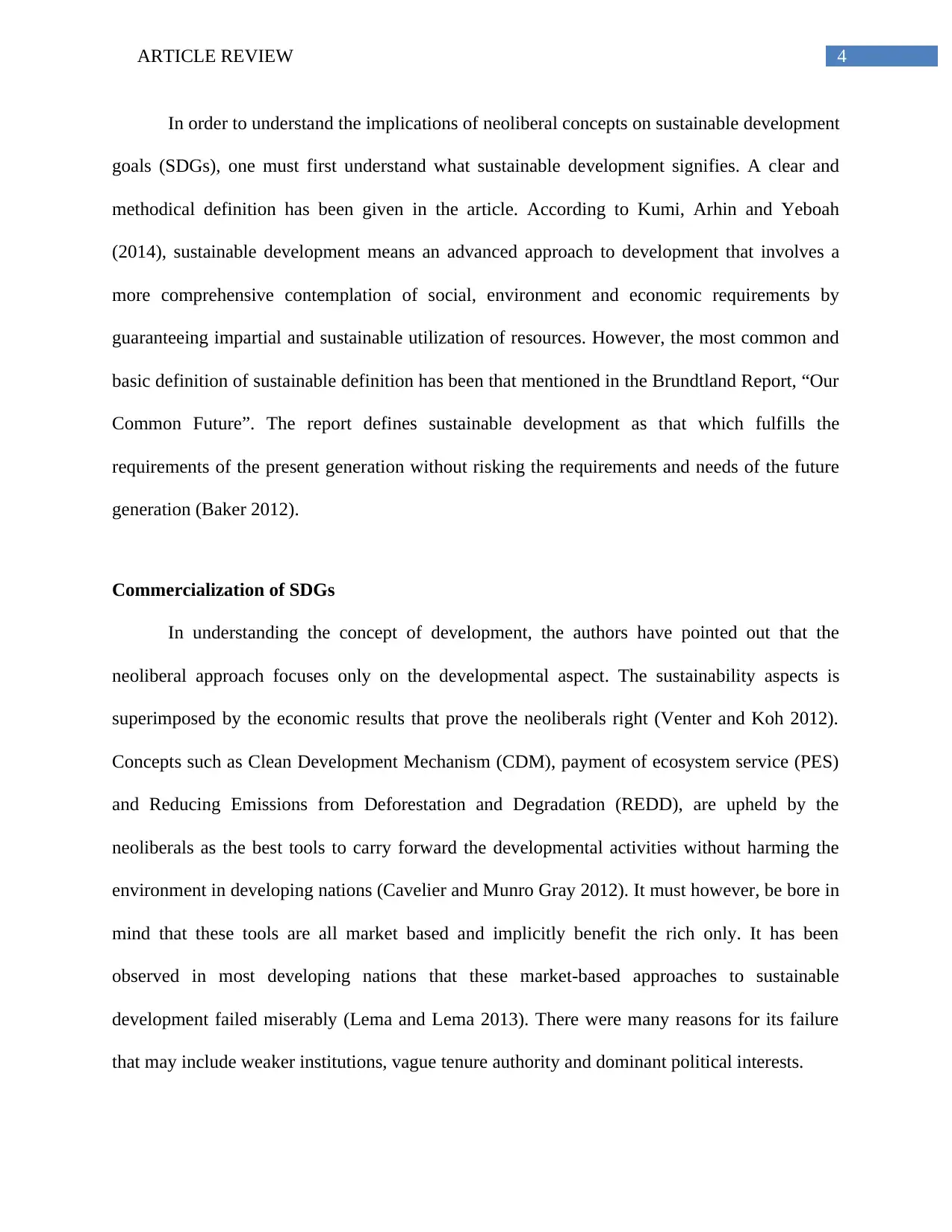
4ARTICLE REVIEW
In order to understand the implications of neoliberal concepts on sustainable development
goals (SDGs), one must first understand what sustainable development signifies. A clear and
methodical definition has been given in the article. According to Kumi, Arhin and Yeboah
(2014), sustainable development means an advanced approach to development that involves a
more comprehensive contemplation of social, environment and economic requirements by
guaranteeing impartial and sustainable utilization of resources. However, the most common and
basic definition of sustainable definition has been that mentioned in the Brundtland Report, “Our
Common Future”. The report defines sustainable development as that which fulfills the
requirements of the present generation without risking the requirements and needs of the future
generation (Baker 2012).
Commercialization of SDGs
In understanding the concept of development, the authors have pointed out that the
neoliberal approach focuses only on the developmental aspect. The sustainability aspects is
superimposed by the economic results that prove the neoliberals right (Venter and Koh 2012).
Concepts such as Clean Development Mechanism (CDM), payment of ecosystem service (PES)
and Reducing Emissions from Deforestation and Degradation (REDD), are upheld by the
neoliberals as the best tools to carry forward the developmental activities without harming the
environment in developing nations (Cavelier and Munro Gray 2012). It must however, be bore in
mind that these tools are all market based and implicitly benefit the rich only. It has been
observed in most developing nations that these market-based approaches to sustainable
development failed miserably (Lema and Lema 2013). There were many reasons for its failure
that may include weaker institutions, vague tenure authority and dominant political interests.
In order to understand the implications of neoliberal concepts on sustainable development
goals (SDGs), one must first understand what sustainable development signifies. A clear and
methodical definition has been given in the article. According to Kumi, Arhin and Yeboah
(2014), sustainable development means an advanced approach to development that involves a
more comprehensive contemplation of social, environment and economic requirements by
guaranteeing impartial and sustainable utilization of resources. However, the most common and
basic definition of sustainable definition has been that mentioned in the Brundtland Report, “Our
Common Future”. The report defines sustainable development as that which fulfills the
requirements of the present generation without risking the requirements and needs of the future
generation (Baker 2012).
Commercialization of SDGs
In understanding the concept of development, the authors have pointed out that the
neoliberal approach focuses only on the developmental aspect. The sustainability aspects is
superimposed by the economic results that prove the neoliberals right (Venter and Koh 2012).
Concepts such as Clean Development Mechanism (CDM), payment of ecosystem service (PES)
and Reducing Emissions from Deforestation and Degradation (REDD), are upheld by the
neoliberals as the best tools to carry forward the developmental activities without harming the
environment in developing nations (Cavelier and Munro Gray 2012). It must however, be bore in
mind that these tools are all market based and implicitly benefit the rich only. It has been
observed in most developing nations that these market-based approaches to sustainable
development failed miserably (Lema and Lema 2013). There were many reasons for its failure
that may include weaker institutions, vague tenure authority and dominant political interests.
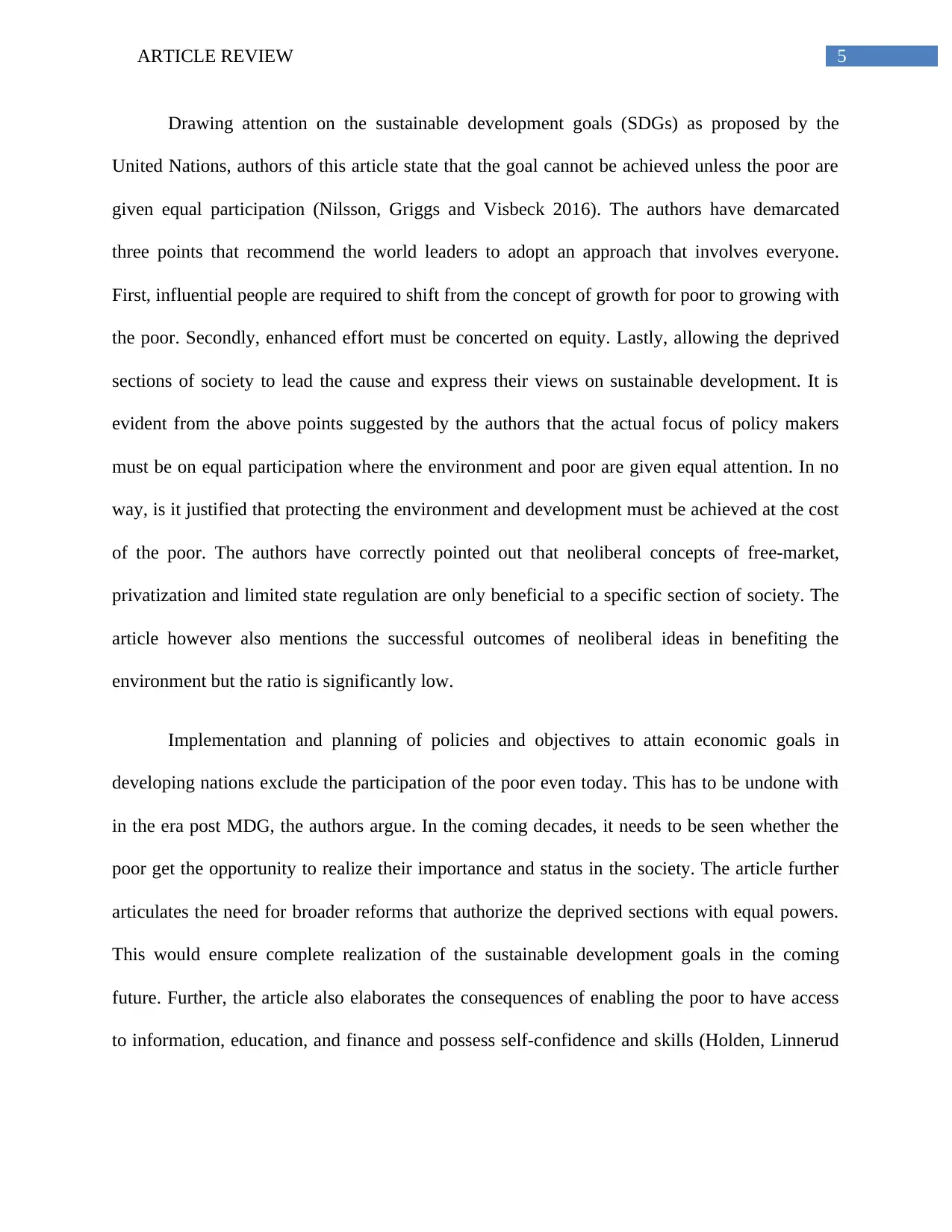
5ARTICLE REVIEW
Drawing attention on the sustainable development goals (SDGs) as proposed by the
United Nations, authors of this article state that the goal cannot be achieved unless the poor are
given equal participation (Nilsson, Griggs and Visbeck 2016). The authors have demarcated
three points that recommend the world leaders to adopt an approach that involves everyone.
First, influential people are required to shift from the concept of growth for poor to growing with
the poor. Secondly, enhanced effort must be concerted on equity. Lastly, allowing the deprived
sections of society to lead the cause and express their views on sustainable development. It is
evident from the above points suggested by the authors that the actual focus of policy makers
must be on equal participation where the environment and poor are given equal attention. In no
way, is it justified that protecting the environment and development must be achieved at the cost
of the poor. The authors have correctly pointed out that neoliberal concepts of free-market,
privatization and limited state regulation are only beneficial to a specific section of society. The
article however also mentions the successful outcomes of neoliberal ideas in benefiting the
environment but the ratio is significantly low.
Implementation and planning of policies and objectives to attain economic goals in
developing nations exclude the participation of the poor even today. This has to be undone with
in the era post MDG, the authors argue. In the coming decades, it needs to be seen whether the
poor get the opportunity to realize their importance and status in the society. The article further
articulates the need for broader reforms that authorize the deprived sections with equal powers.
This would ensure complete realization of the sustainable development goals in the coming
future. Further, the article also elaborates the consequences of enabling the poor to have access
to information, education, and finance and possess self-confidence and skills (Holden, Linnerud
Drawing attention on the sustainable development goals (SDGs) as proposed by the
United Nations, authors of this article state that the goal cannot be achieved unless the poor are
given equal participation (Nilsson, Griggs and Visbeck 2016). The authors have demarcated
three points that recommend the world leaders to adopt an approach that involves everyone.
First, influential people are required to shift from the concept of growth for poor to growing with
the poor. Secondly, enhanced effort must be concerted on equity. Lastly, allowing the deprived
sections of society to lead the cause and express their views on sustainable development. It is
evident from the above points suggested by the authors that the actual focus of policy makers
must be on equal participation where the environment and poor are given equal attention. In no
way, is it justified that protecting the environment and development must be achieved at the cost
of the poor. The authors have correctly pointed out that neoliberal concepts of free-market,
privatization and limited state regulation are only beneficial to a specific section of society. The
article however also mentions the successful outcomes of neoliberal ideas in benefiting the
environment but the ratio is significantly low.
Implementation and planning of policies and objectives to attain economic goals in
developing nations exclude the participation of the poor even today. This has to be undone with
in the era post MDG, the authors argue. In the coming decades, it needs to be seen whether the
poor get the opportunity to realize their importance and status in the society. The article further
articulates the need for broader reforms that authorize the deprived sections with equal powers.
This would ensure complete realization of the sustainable development goals in the coming
future. Further, the article also elaborates the consequences of enabling the poor to have access
to information, education, and finance and possess self-confidence and skills (Holden, Linnerud
⊘ This is a preview!⊘
Do you want full access?
Subscribe today to unlock all pages.

Trusted by 1+ million students worldwide
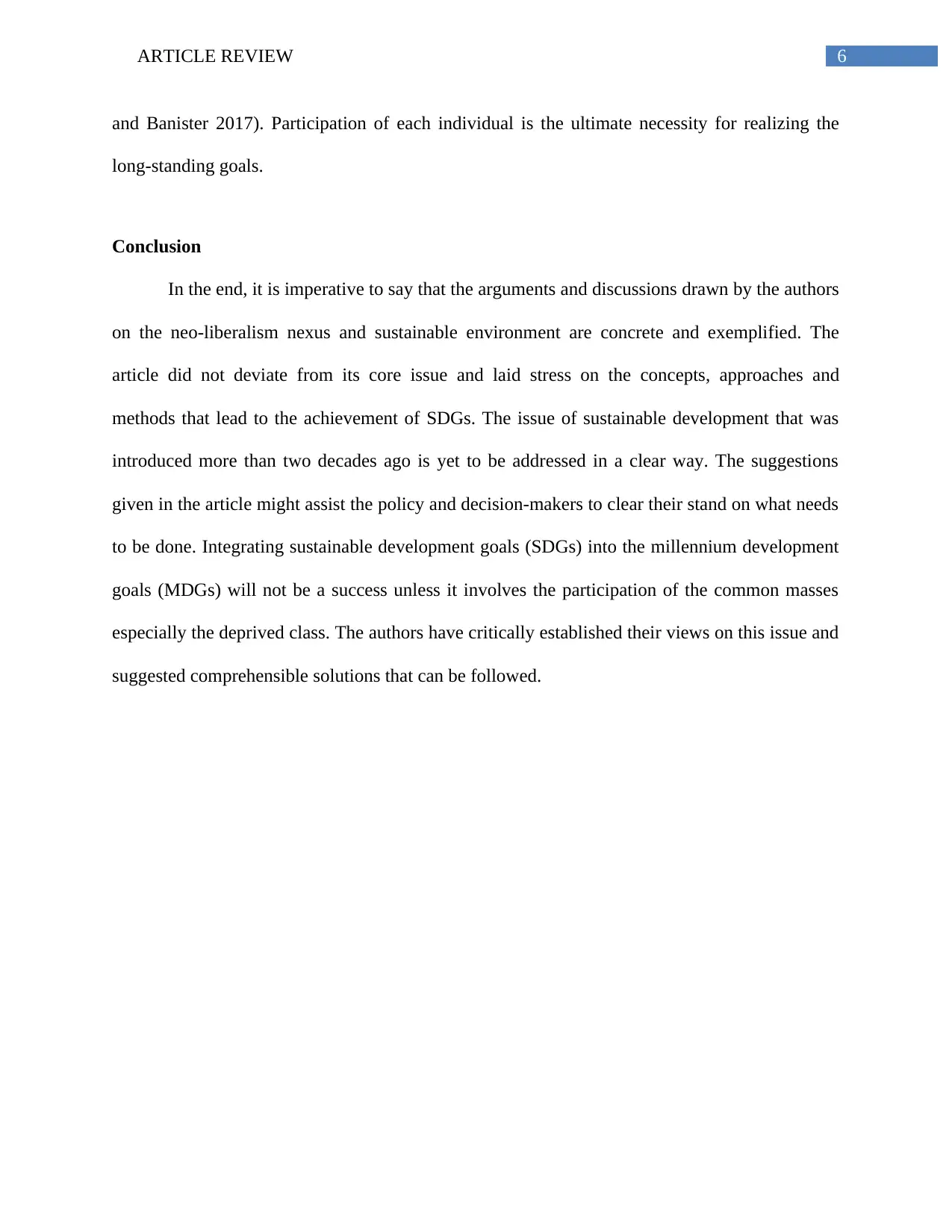
6ARTICLE REVIEW
and Banister 2017). Participation of each individual is the ultimate necessity for realizing the
long-standing goals.
Conclusion
In the end, it is imperative to say that the arguments and discussions drawn by the authors
on the neo-liberalism nexus and sustainable environment are concrete and exemplified. The
article did not deviate from its core issue and laid stress on the concepts, approaches and
methods that lead to the achievement of SDGs. The issue of sustainable development that was
introduced more than two decades ago is yet to be addressed in a clear way. The suggestions
given in the article might assist the policy and decision-makers to clear their stand on what needs
to be done. Integrating sustainable development goals (SDGs) into the millennium development
goals (MDGs) will not be a success unless it involves the participation of the common masses
especially the deprived class. The authors have critically established their views on this issue and
suggested comprehensible solutions that can be followed.
and Banister 2017). Participation of each individual is the ultimate necessity for realizing the
long-standing goals.
Conclusion
In the end, it is imperative to say that the arguments and discussions drawn by the authors
on the neo-liberalism nexus and sustainable environment are concrete and exemplified. The
article did not deviate from its core issue and laid stress on the concepts, approaches and
methods that lead to the achievement of SDGs. The issue of sustainable development that was
introduced more than two decades ago is yet to be addressed in a clear way. The suggestions
given in the article might assist the policy and decision-makers to clear their stand on what needs
to be done. Integrating sustainable development goals (SDGs) into the millennium development
goals (MDGs) will not be a success unless it involves the participation of the common masses
especially the deprived class. The authors have critically established their views on this issue and
suggested comprehensible solutions that can be followed.
Paraphrase This Document
Need a fresh take? Get an instant paraphrase of this document with our AI Paraphraser
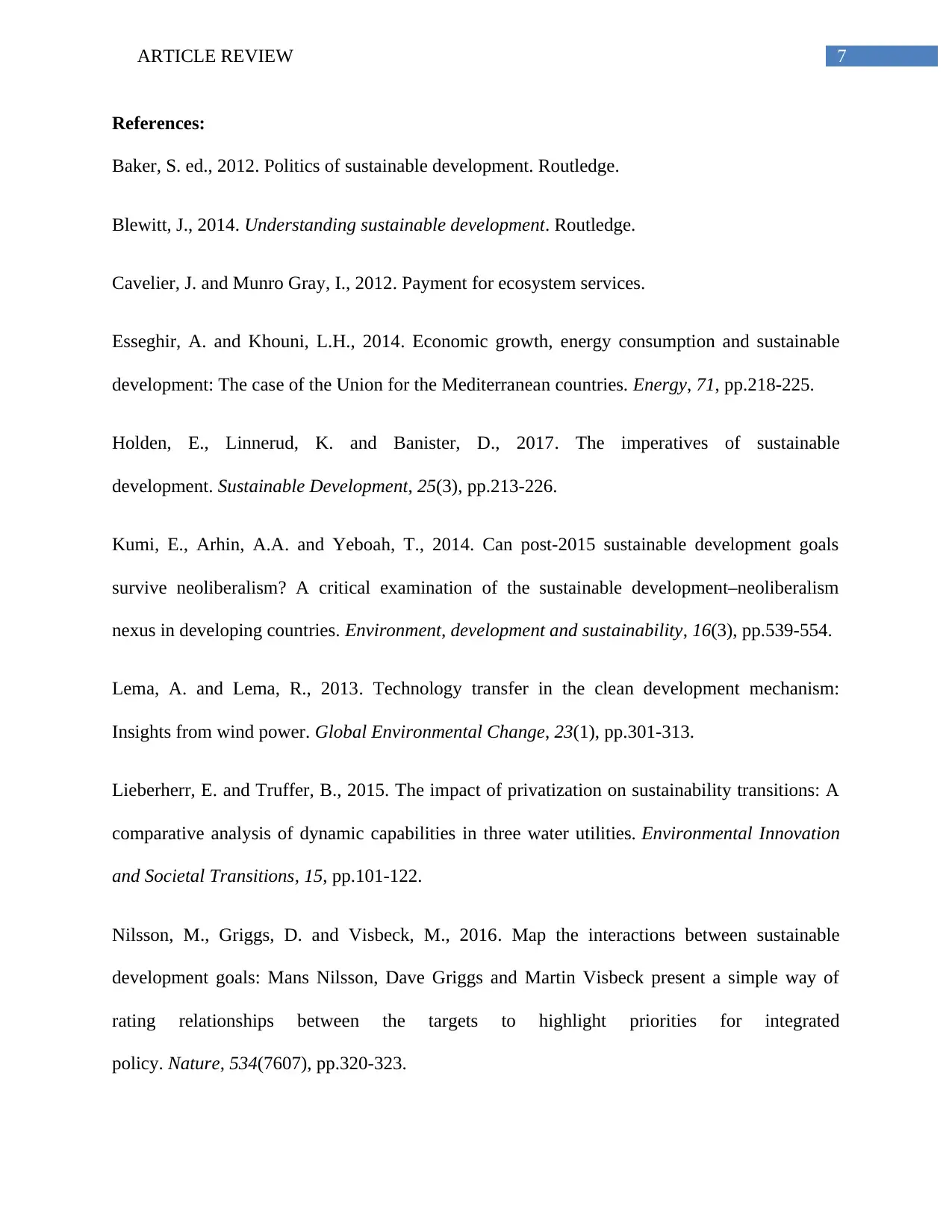
7ARTICLE REVIEW
References:
Baker, S. ed., 2012. Politics of sustainable development. Routledge.
Blewitt, J., 2014. Understanding sustainable development. Routledge.
Cavelier, J. and Munro Gray, I., 2012. Payment for ecosystem services.
Esseghir, A. and Khouni, L.H., 2014. Economic growth, energy consumption and sustainable
development: The case of the Union for the Mediterranean countries. Energy, 71, pp.218-225.
Holden, E., Linnerud, K. and Banister, D., 2017. The imperatives of sustainable
development. Sustainable Development, 25(3), pp.213-226.
Kumi, E., Arhin, A.A. and Yeboah, T., 2014. Can post-2015 sustainable development goals
survive neoliberalism? A critical examination of the sustainable development–neoliberalism
nexus in developing countries. Environment, development and sustainability, 16(3), pp.539-554.
Lema, A. and Lema, R., 2013. Technology transfer in the clean development mechanism:
Insights from wind power. Global Environmental Change, 23(1), pp.301-313.
Lieberherr, E. and Truffer, B., 2015. The impact of privatization on sustainability transitions: A
comparative analysis of dynamic capabilities in three water utilities. Environmental Innovation
and Societal Transitions, 15, pp.101-122.
Nilsson, M., Griggs, D. and Visbeck, M., 2016. Map the interactions between sustainable
development goals: Mans Nilsson, Dave Griggs and Martin Visbeck present a simple way of
rating relationships between the targets to highlight priorities for integrated
policy. Nature, 534(7607), pp.320-323.
References:
Baker, S. ed., 2012. Politics of sustainable development. Routledge.
Blewitt, J., 2014. Understanding sustainable development. Routledge.
Cavelier, J. and Munro Gray, I., 2012. Payment for ecosystem services.
Esseghir, A. and Khouni, L.H., 2014. Economic growth, energy consumption and sustainable
development: The case of the Union for the Mediterranean countries. Energy, 71, pp.218-225.
Holden, E., Linnerud, K. and Banister, D., 2017. The imperatives of sustainable
development. Sustainable Development, 25(3), pp.213-226.
Kumi, E., Arhin, A.A. and Yeboah, T., 2014. Can post-2015 sustainable development goals
survive neoliberalism? A critical examination of the sustainable development–neoliberalism
nexus in developing countries. Environment, development and sustainability, 16(3), pp.539-554.
Lema, A. and Lema, R., 2013. Technology transfer in the clean development mechanism:
Insights from wind power. Global Environmental Change, 23(1), pp.301-313.
Lieberherr, E. and Truffer, B., 2015. The impact of privatization on sustainability transitions: A
comparative analysis of dynamic capabilities in three water utilities. Environmental Innovation
and Societal Transitions, 15, pp.101-122.
Nilsson, M., Griggs, D. and Visbeck, M., 2016. Map the interactions between sustainable
development goals: Mans Nilsson, Dave Griggs and Martin Visbeck present a simple way of
rating relationships between the targets to highlight priorities for integrated
policy. Nature, 534(7607), pp.320-323.
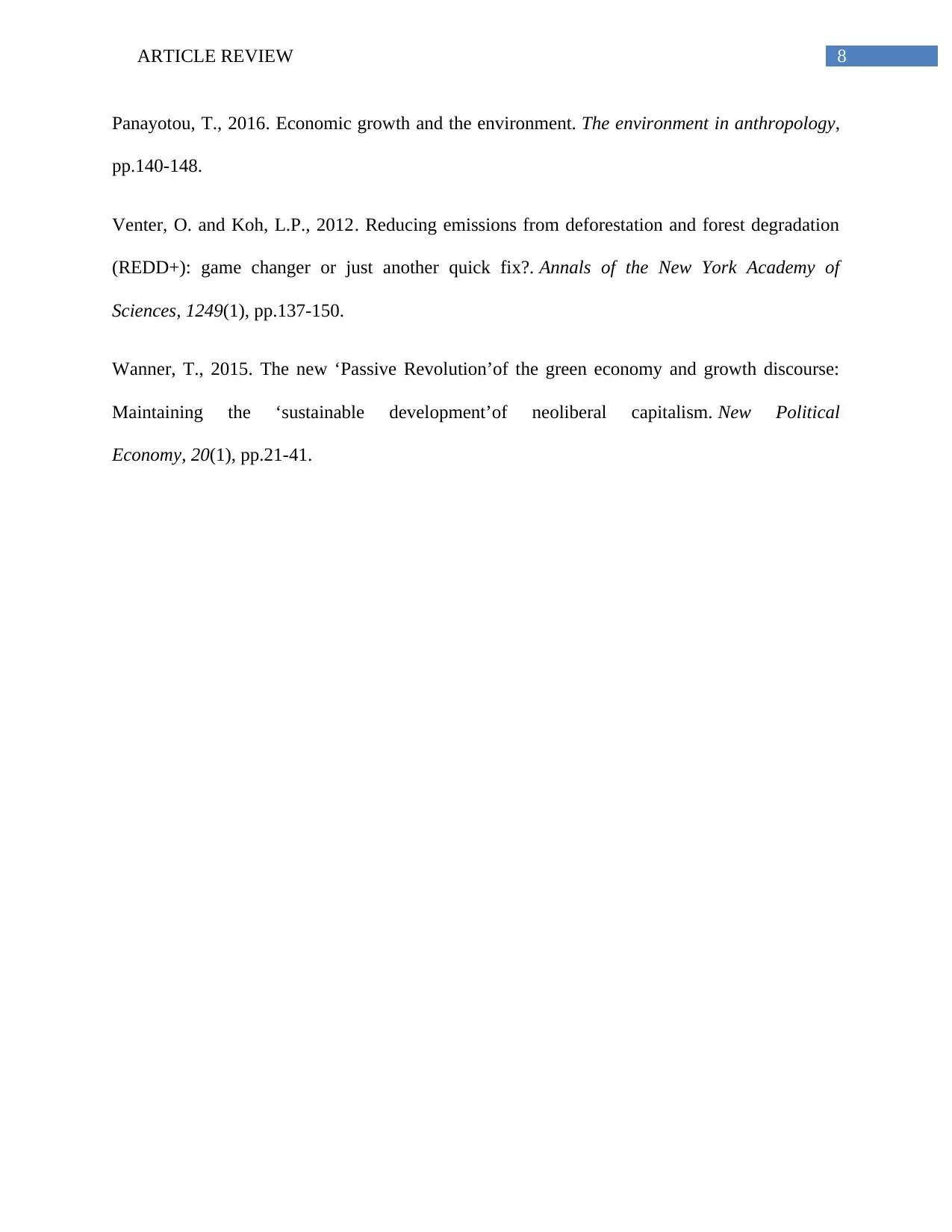
8ARTICLE REVIEW
Panayotou, T., 2016. Economic growth and the environment. The environment in anthropology,
pp.140-148.
Venter, O. and Koh, L.P., 2012. Reducing emissions from deforestation and forest degradation
(REDD+): game changer or just another quick fix?. Annals of the New York Academy of
Sciences, 1249(1), pp.137-150.
Wanner, T., 2015. The new ‘Passive Revolution’of the green economy and growth discourse:
Maintaining the ‘sustainable development’of neoliberal capitalism. New Political
Economy, 20(1), pp.21-41.
Panayotou, T., 2016. Economic growth and the environment. The environment in anthropology,
pp.140-148.
Venter, O. and Koh, L.P., 2012. Reducing emissions from deforestation and forest degradation
(REDD+): game changer or just another quick fix?. Annals of the New York Academy of
Sciences, 1249(1), pp.137-150.
Wanner, T., 2015. The new ‘Passive Revolution’of the green economy and growth discourse:
Maintaining the ‘sustainable development’of neoliberal capitalism. New Political
Economy, 20(1), pp.21-41.
⊘ This is a preview!⊘
Do you want full access?
Subscribe today to unlock all pages.

Trusted by 1+ million students worldwide

9ARTICLE REVIEW
1 out of 10
Related Documents
Your All-in-One AI-Powered Toolkit for Academic Success.
+13062052269
info@desklib.com
Available 24*7 on WhatsApp / Email
![[object Object]](/_next/static/media/star-bottom.7253800d.svg)
Unlock your academic potential
Copyright © 2020–2026 A2Z Services. All Rights Reserved. Developed and managed by ZUCOL.





